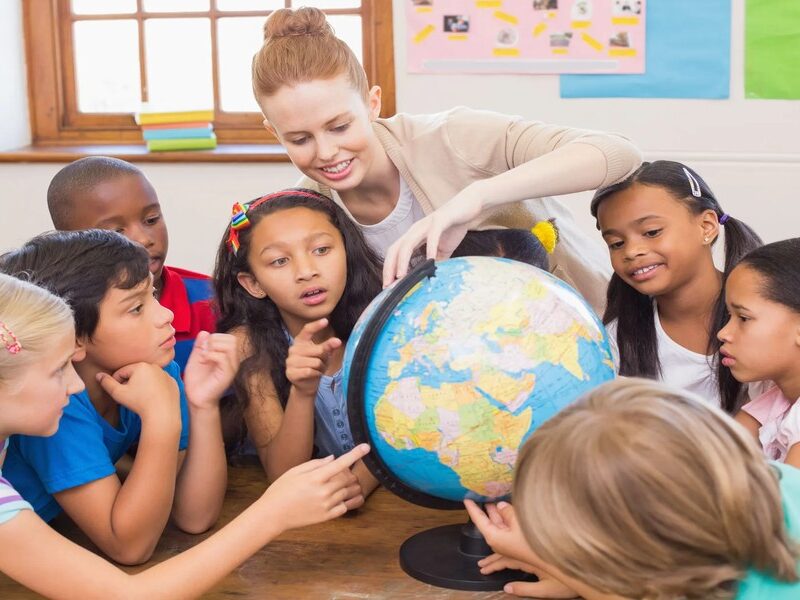Early childhood education and learning lay the foundation for a child’s emotional, intellectual and social development. These formative years are crucial for children’s future success and learning. They typically last from birth until age eight. Early education fosters not only academic abilities, but also creativity, curiosity and resilience. This sets children on the path to lifelong success.
Early Childhood Education is Important
The first few years in life are critical for brain development, according to research. During these years, the brain of a child forms connections rapidly, influenced both by their experiences and their interactions with their surroundings.
- Cognitive Development
Early education exposes children to basic concepts like numbers, letters and shapes. This creates a solid foundation for future academic pursuits. Puzzles, stories, and play-based activities stimulate critical thinking and problem-solving skills. - Social and emotional growth
Children can learn to navigate social situations and share with their peers in early learning environments. These interactions build emotional intelligence, self-regulation, and empathy. - Language and Communication Skills
Early exposure to rich language and vocabulary enhances the ability of a child to understand and express himself, as well as engage in meaningful conversation. Reading aloud, singing songs and other activities that involve language development are important. - Physical Development
Through activities such as drawing, playing outside, or building with blocks, gross and fine motor skills can be developed. These activities promote overall health and coordination.
Key Elements of Early Learning and Childhood Education
Early childhood education programs should be comprehensive and include a variety of elements that will ensure the holistic development of a child.
1. Play Based Learning
Early education is incomplete without play. Play allows children to explore their environment, develop creativity and problem-solving abilities. These activities, whether it is pretend play, building blocks or doing art projects, encourage imagination and cognitive development.
2. Structured Routines
Routines that are consistent give children a feeling of predictability and stability. Routines such as meals, naps and learning sessions can help children develop their time management skills and feel more secure.
3. Individualized Attention
Each child has their own unique learning pace and needs. Early education programs that are effective adapt to the differences by offering personalized activities to help each child develop their strengths and improve areas of weakness.
4. Parental involvement
The role of parents in the early education of their children is crucial. Parents can strengthen the relationship between their home and school by engaging them in activities such as reading together, talking about daily experiences or taking part in school events.
5. Qualified Educators
Skilled educators who have expertise in the early childhood development know how to create stimulating and nurturing environments. They help children overcome challenges and gain confidence in their abilities.
The Benefits of Early Learning and Childhood Education
1. Academic Readiness
Early childhood education prepares children for the academic demands in primary school. They are better prepared for primary school because they have a solid foundation of knowledge and focus.
2. Improved Social Skills
Early learning environments help children learn to resolve conflicts and build friendships. These social skills will be essential for future teamwork and relationships.
3. Confidence Increased
Early success in education activities fosters self-esteem, and a positive attitude towards learning. Confident children will be more willing to accept new challenges and persevere through difficult times.
4. Habits of Lifelong Learning
Early exposure to different activities and experiences fosters a love of learning and curiosity. These habits are often carried into adulthood and adolescence, and contribute to academic and professional achievement.
5. Reduced developmental gaps
Early childhood education can help close the developmental gap, especially for children who come from disadvantaged backgrounds. All children can thrive with programs that emphasize cognitive, emotional and social skills.
Strategies for Supporting Early Learning at Home
Parents and caregivers are also able to support the development of their child at home. While formal early childhood education programs play an important role, they can do so in a variety of ways. Here are some strategies that can be used:
- Read Daily
Aloud reading to your child will improve their language skills and encourage a love of books. Make reading interactive by choosing stories that are age-appropriate and asking questions about the story. - Encourage Curiosity
Encourage your child to explore his or her interests by answering their questions. To stimulate your child’s curiosity, engage them in hands-on activities such as science experiments, art or nature projects. - Provide Learning Materials
Use age-appropriate puzzles and games to encourage creativity and problem-solving. Simple household items such as measuring cups and cardboard boxes can be used to educate children. - Promote Social Interaction
Organise playdates or other group activities for your child to develop their social skills. Encourage conflict resolution and cooperative play. - Create a Routine
Routines that are consistent each day create a feeling of security for children and allow them to transition easily between activities. Include time for meals, rest, learning and play.
Challenges in Early Childhood Education
Early childhood education is important, but it faces many challenges.
- Accessibility and affordability Not all families can afford quality early childhood education programs. This can lead to disparities in development opportunities.
- Qualified Teachers There is an increasing need for professionals with the right training in early education.
- Balance Play and Academics : Finding the right balance of structured learning and free-play can be difficult.
To address these challenges, educators, parents, and policy makers must work together to make sure that every child can benefit from early education.
Early childhood education and learning is essential to a child’s emotional, intellectual and social development. Parents, educators, and caregivers can provide a stimulating and supportive environment to help children develop a solid foundation for learning and success throughout their lives. The opportunities that are created in these formative years, whether through structured routines or play-based activities with parents, have a lasting and profound impact on the child’s growth. Every child can reach their potential with the right support.
This post was written by a professional at Baby Fox Academy of Florida. Baby Fox Academy is your premier choice for high-quality early learning center Sarasota, FL, blending structured learning with the magic of play. Owned and operated by Laurie and Matt McCracken, Baby Fox Academy benefits from Laurie’s 25+ years of experience in early childhood education. Our play-based curriculum supports every child’s growth, balancing indoor and outdoor activities that build fine motor skills, creativity, language, and independence. With engaging tools like puzzles, dramatic play, and art, children develop essential skills while exploring their world. Parents can check in anytime via secure “Trail Cams” through WatchMeGrow, giving peace of mind while children learn, play, and grow. At Baby Fox Academy, your “baby fox” will thrive in a nurturing environment designed to inspire a lifelong love of learning.




